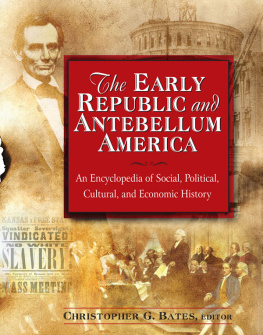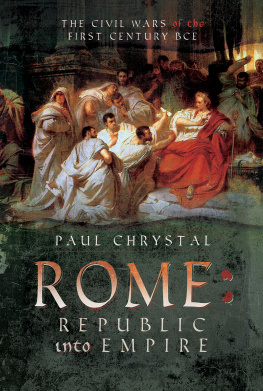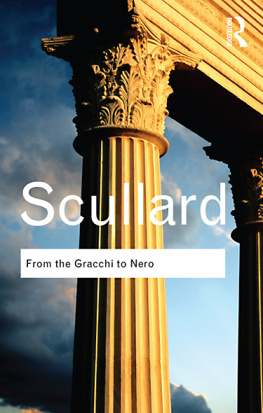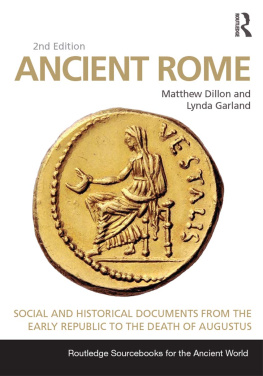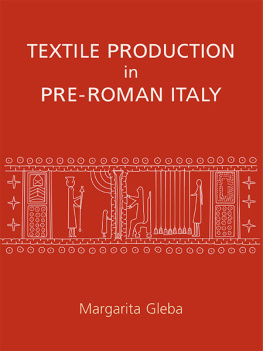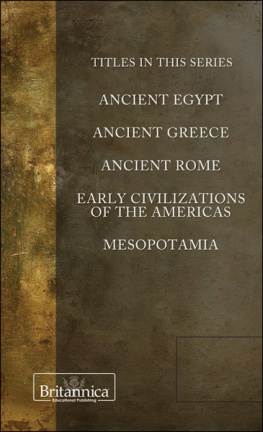In this book, Gabriele Cifani reconstructs the early economic history of Rome, from the Iron Age to the early Republic. Bringing a multidisciplinary approach to the topic, he argues that the early Roman economy was more diversified than has been previously acknowledged, going well beyond agriculture and pastoralism. Cifani bases his argument on a systematic review of archaeological evidence for production, trade and consumption. He posits that the existence of a network system, based on cultural interaction, social mobility and trade, connected Rome and central Tyrrhenian Italy to the Mediterranean Basin even in this early period of Romes history. Moreover, these trade and cultural links existed in parallel to regional diversified economies and institutions. Cifanis book thus offers new insights into the economic basis for the rise of Rome, as well as the social structures of Mediterranean Iron Age societies.
Gabriele Cifani teaches classical archaeology at the University of Rome Tor Vergata.
University Printing House, Cambridge CB 2 8 BS , United Kingdom
One Liberty Plaza, 20th Floor, New York, NY 10006, USA
477 Williamstown Road, Port Melbourne, VIC 3207, Australia
314321, 3rd Floor, Plot 3, Splendor Forum, Jasola District Centre, New Delhi 110025, India
79 Anson Road, #0604/06, Singapore 079906
Cambridge University Press is part of the University of Cambridge.
It furthers the Universitys mission by disseminating knowledge in the pursuit of education, learning, and research at the highest international levels of excellence.
www.cambridge.org
Information on this title: www.cambridge.org/9781108478953
DOI: 10.1017/9781108781534
Cambridge University Press 2021
This publication is in copyright. Subject to statutory exception and to the provisions of relevant collective licensing agreements, no reproduction of any part may take place without the written permission of Cambridge University Press.
First published 2021
Printed in the United Kingdom by TJ International Ltd, Padstow Cornwall
A catalogue record for this publication is available from the British Library.
Library of Congress Cataloging-in-Publication Data
Names : Cifani, Gabriele, author.
Title : The Origins of the Roman Economy : From the Iron Age to the Early Republic in a Mediterranean Perspective / Gabriele Cifani, University of Rome Tor Vergata La Sapianza.
Description : New York : Cambridge University Press, 2021. | Includes bibliographical references and index.
Identifiers: LCCN 2019040766 (print) | LCCN 2019040767 (ebook) | ISBN 9781108478953 (hardback) | ISBN 9781108748742 (paperback) | ISBN 9781108781534 (epub)
Subjects: LCSH : RomeEconomic conditions. | RomeSocial conditions. | RomeHistoryKings, 753-510 B.C | RomeHistoryRepublic, 510-265 B.C .
Classification: LCC HC 39 . C 52 2021 (print) | LCC HC 39 (ebook) | DDC 330.937/01dc23
LC record available at https://lccn.loc.gov/2019040766
LC ebook record available at https://lccn.loc.gov/2019040767
ISBN 978-1-108-47895-3 Hardback
Cambridge University Press has no responsibility for the persistence or accuracy of URLs for external or third-party internet websites referred to in this publication and does not guarantee that any content on such websites is, or will remain, accurate or appropriate.
Valentinae
, .
, ,
, .
Neither the writer nor the reader of history, therefore, should confine his attention to a bare statement of facts: he must take into account all that preceded, accompanied, or followed them.
For if you take from history all explanation of cause, principle, and motive, and of the adaptation of the means to the end, what is left is a mere panorama without being instructive;
and, though it may please for the moment, has no abiding value.
Polyb. III, 31, 1113
(text and translation from Hultsch, Shuckburgh 1889)
Contents
Figures
Tables
Acknowledgements
This book represents an expanded version of the six lectures that I had the pleasure and privilege of giving as visiting professor at the cole normale suprieure in Paris in the autumn of 2016.
In conception, however, the book started much earlier, during an Alexander von Humboldt Fellowship at the Freie Universitt of Berlin in 2005, while I was preparing a monograph on archaic Roman architecture.
At that time I found the majority of the explanations for the rise of Rome between the eighth and fourth centuries BC unsatisfactory, out of date, stereotypical and highly speculative, based as they were on simple agriculture and pastoralism or the need to plunder nearby communities or to respond to social struggles within the civic body, with very little attention paid to long-term transformations or evidence of production and trade in the Roman community itself.
Further material was collected in 2006 and 2007 during a Marie Curie Fellowship in the Department of Archaeology at the University of Cambridge, where I also discussed many issues with Simon Stoddart and Graeme Barker.
In the following years, I examined aspects of this research in many seminars and lectures, thanks also to rising interest in the topic, perhaps not unrelated to the economic crisis which has affected the western world in the last decade.
In April 2010, a joint seminar on the economy of early Rome with Professor Tim Cornell at the Institute of Classical Archaeology in London was a great opportunity to review some of the problematic evidence of the research period, particularly with Professors David Ridgway and Michael Crawford.
In May 2012, a workshop at the British School of Rome provided an occasion for debate with Carmine Ampolo (Scuola Normale Superiore di Pisa), Christopher Smith (University of St Andrews), Luigi Capogrossi Colognesi (University of Rome La Sapienza), Fiorenzo Catalli (Ministero dei Beni Culturali), Maurizio Bettini (University di Siena) and Cristiano Viglietti (University of Siena) on many issues related to archaic economies.
Thereafter, in May 2015, two seminars on archaic Rome organised at Warsaw University presented a rare opportunity to discuss matters with Professors Adam Zikowski and Benedetto Bravo, whose criticisms on archaic Mediterranean history and society were an invaluable source of stimuli for reflection.
In addition, it would be unfair not to recall the instructive dialogue on the history and archaeology of the archaic Mediterranean which I have enjoyed with a large number of friends and colleagues over many years.
I am, therefore, particularly pleased to be able to thank the following for both criticism and information: Andrea Carandini (University of Rome La Sapienza), Giovanni Colonna (Accademia dei Lincei), Mario Torelli (Accademia dei Lincei), Mario Mazza (Accademia dei Lincei), Michel Gras (Centre national de la recherche scientifique, CNRS), Martin Bentz (University of Bonn), Adolf Borbein (Freie Universitt Berlin), Christopher Pare (University of Mainz), Paolo Carafa (University of Rome La Sapienza), Marijke Gnade (University of Amsterdam), Clementina Panella (University of Rome La Sapienza), Alessandro Naso (University of Napoli Federico II), Piero Alfredo Gianfrotta (University of Tuscia, Viterbo), Fernando Gilotta (University of Campania Luigi Vanvitelli), Andrea Zifferero (University of Siena), Ramsay MacMullen (Yale University), Nicola Terrenato (University of Michigan), Marco Maiuro (University of Rome La Sapienza), Luca Alessandri (University of Groningen), Francesca Romana Fiano (Rome), Antonio Ferrandes (University of Rome La Sapienza), Andrea Babbi (Romano-Germanic Central Museum, Mainz), Enrico Benelli (Consiglio Nazionale delle Ricerche, CNR), Francesca Boitani (Ministero dei Beni Culturali), Alessandro Corretti (Scuola Normale Superiore di Pisa), Lucio Fiorini (University of Perugia), Helga Di Giuseppe (Rome), Geoffrey Kron (University of Victoria), Eero Jarva (University of Oulu), Alexandra Villing (British Museum, London), Francesco di Gennaro (Ministero dei Beni Culturali), Anna De Santis (Ministero dei Beni Culturali), Alessandro Guidi (Roma Tre University), Alessandro Bettelli (CNR), Marco Pacciarelli (University of Napoli Federico II), Massimo Botto (CNR), Vincenzo Bellelli (CNR), Francesca Mermati (Ministero dei Beni Culturali), Joachim Weidig (Albert-Ludwigs-Universitt Freiburg), Joachim Heiden (Deutsche Archologische Institut, Abteilung Athen), Nicolas L. J. Meunier (Universit Saint-Louis Bruxelles), Jacopo De Grossi Mazzorin (University of Salento), Claudia Minniti (University of Salento), Eugenio Cerilli (Roma), Letizia Ceccarelli (Polytechnic University of Milano), Angelo Amoroso (Roma), Alessandro Delfino (Rome) and Tersilio Leggio (Rieti).


